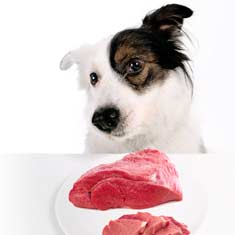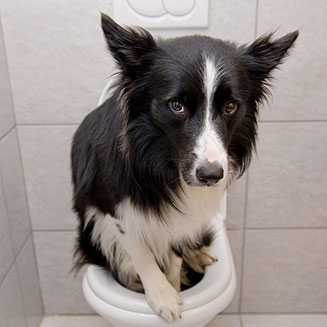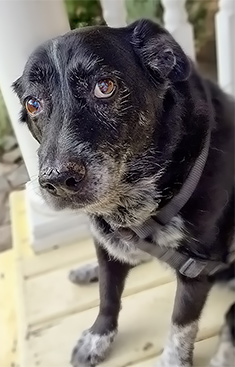Holistic Veterinary Care
According to the American Holistic Veterinary Medical Association, the goal of holistic veterinary care is to use alternative and complementary approaches to veterinary healthcare, integrating all aspects of animal wellness in a socially and environmentally responsible manner. What exactly does that mean?
What's included in holistic vet care?
Holistic veterinary medicine, like it's holistic humankind medical brother, is concerned with treating illness using non-traditional western medicine. Many of the holistic concepts come from the ancient cultures of the Orient and may seem strange to those of us who are used to MRI machines, expensive diagnostics, and targeted conventional treatments.
Holistic medicine includes such practices as acupuncture, proper nutrition, herbal remedies, dietary supplements, color and music therapy, acupressure, electromagnetics and radiation, homeopathy, heavy metal poisoning, and healing quartz crystals.
What's the difference between regular vet care and holistic care?
The major emphasis of holistic medicine is on keeping the animal in such good health that most illnesses are prevented. Whereas conventional Western medicine focuses on treating conditions as they occur, holistic medicine tries to treat them before they occur to keep your dog from experiencing even one moment of discomfort.
Conventional Western medicine is excellent at treating broken bones, bacterial infections, and other acute illnesses that most dogs will experience at some point in their lives. In other words, it tries to relieve each symptom as it arises. Holistic medicine, on the other hand, is much more adept at preventing degenerative diseases such as arthritis and chronic diseases like allergies. It treats the animal's body as a whole, rather than as pieces and parts.
Holistic medicine looks at your dog as an interconnected web of systems, meaning that something that changes one part of the system is liable to have an effect on other parts, as well. By contrast, conventional medicine sees your dog as a series of isolated parts. Treatment might be given for diarrhea without thought as to what the treatment might do for systems outside the gastrointestinal tract.
How can nutritional therapy help my dog?
The central tenet of holistic medicine is to use a healthy diet to prevent your dog from getting sick. Just as your mother has told you for years to stop eating junk food, it's your job to make sure your dog gets the nutrients he needs from his food. The pet food industry as we know it has only been around for about 60 years. Prior to that time, dogs were fed primarily table scraps, which at the time consisted of meats and vegetables, with a few potatoes thrown in now and again. Commercial pet food was introduced and became popular primarily because of its convenience, not because it is especially good at providing the proper nutrients.
Like any for-profit company, pet food makers are interested in making money. And (surprise!) it's cheaper to make food using grains than it is to use meat products. This has resulted in commercial dog foods that fill your dog's stomach to make him feel full, but don't digest well to provide the body's tissues with the proteins they crave.
Many holistic vets recommend that dogs be fed only raw foods which contain thousands of enzymes, phytonutrients, and antioxidants. These nutrients are destroyed when meat is heated, processed, and extruded into the kibble that shows up on the grocery store shelves.
Your dog needs fresh protein, from both meat and non-meat sources and a small amount of carbohydrates, primarily in the form of whole grains. You can add a few vegetables to round out his meals. In addition, supplements such as fish oils and calcium are helpful for his coat, bone, and teeth. One suggested diet includes 6 ounces of meat with its fatty juices, 2 ounces of rice, and 2 ounces of mixed vegetables per day for every 10 pounds of dog.
Controversy exists as to whether natural foods should be fed cooked or raw, Conventional wisdom says that dogs are not susceptible to e. coli the way humans are, so it will not hurt them to eat raw meat. However, some vets discourage the feeding of raw meat as it can lead to salmonella, and can in fact give dogs diarrhea.
What is homeopathic veterinary medicine?
Homeopathic medicine recognizes that the body contains a lot of energy. Using vibrational therapy, homeopathic vets seeks to stimulate the body to tap into its own energy, leading to better health. It was developed in Germany in the late 18th century, and is said to treat the whole animal including mental, emotional, and physical symptoms.
The theory is that if a large amount of a particular substance makes a healthy animal sick, a small amount of the same substance can be used to make a sick animal healthy. This isn't as crazy as it may sound. It is actually the theory behind allergy shots that many humans swear by. A small amount of a homeopathic substance is given to your dog to trigger his immune system, sensitizing it to the substance. Any future introduction of the substance will then be recognized by the body and the substance will be attacked by the pre-sensitized immune system.
Does acupuncture work for dogs?
Acupuncture, the ancient art of using small-gauge needles to stimulate the body to respond to illness, has been around for at least 7,000 years. It can treat any number of illnesses, but appears to provide especially good results against chronic pain.
Although it may look painful, acupuncture uses such small needles that the dog rarely experiences any discomfort. Acupuncture has been use to successfully treat conditions as diverse as gastrointestinal problems, neurological disorders, urinary incontinence, and spinal disc disease. A recent article in the New York Times describes the results one of their reporters saw with her best friend.

How do herbals work?
Herbal therapy uses the power of plant extracts to prevent disease. The Chinese have turned this form of medicine into an art form, much of what we know having been drawn from ancient Chinese practices. There are over 100 different herbs that can be used to treat animals, including those for urinary tract health, skin health, ear health, and joint health. The Only Natural Pet Store has a huge selection, as well as descriptions of what each product is designed to do.
The Veterinary Botanical Medicine Association can help you find an herbalist in your area.
Is holistic medicine right for my dog?
Holistic veterinary medicine has been used to treat everything from flea infestation to epilepsy to cancer to obesity. One of the key reasons why it works is that pets have not been "trained" to suspect that things that are unfamiliar or unconventional will automatically be unhelpful. If your pet is suffering from any illness, or even if you want to prevent him from becoming sick, you might just open your mind and give holistic medicine a try.
Doggies Den: Latest Articles
 Homemade Thanksgiving Treats for Your Dog
Homemade Thanksgiving Treats for Your Dog
NUTRITION We all want to include our dogs in our holiday celebrations, but hopefully, you're aware that sharing table scraps with your dog isn't always the best idea.
 Keeping Your Dog Safe during the Summer Months
Keeping Your Dog Safe during the Summer Months
HEALTH Summer is coming on fast, so it’s time to plan how you will keep your dog safe and healthy through the lazy, carefree, warm days.
 Vaccination Time Again-Keeping Your Puppy Healthy
Vaccination Time Again-Keeping Your Puppy Healthy
DOG HEALTH So you have your new puppy picked out. There are quite a few shots, treatments and examinations that will keep the newest member of your family healthy.
 Canine Thanksgiving Feast
Canine Thanksgiving Feast
NUTRITION With the wide variety of food at Thanksgiving dinner, chances are you'll want to give your dog something special, too. If you're contemplating what to feed your dog for the holiday, here is a guide to a great Canine Thanksgiving Feast.
 Dog Walking Tips Every Owner Should Know
Dog Walking Tips Every Owner Should Know
DOG FUN Walking your dog is not only crucial to keeping him healthy and happy, it strengthens the bond between your canine friend and his caregiver. There are a lot of obstacles out there. Don’t forget these simple tips to keep your walk fun and safe in the outside world.
 The Benefits of Physiotherapy for your Dog
The Benefits of Physiotherapy for your Dog
HEALTH The same techniques that physiotherapists use to treat a variety of injuries and conditions in humans have been adapted to suit animals with great success. Family pets, show dogs, and working dogs can all benefit greatly from physiotherapy. Dogs whose activities involve a lot of agility are especially susceptible to the types of problems that physiotherapy can address.
 The Decision- Adding a Dog to Your Family
The Decision- Adding a Dog to Your Family
FIRST TIME OWNERSBringing a dog into your family is a decision where many people don’t realize it’s magnitude until after they have the dog. There are a number of things that you need to research before you decide to purchase a dog, and it starts right in your own home.
 Bringing Your Dog Into Your New Baby's Life
Bringing Your Dog Into Your New Baby's Life
HEALTH Many believe that a dog and a new baby cannot happily coexist, so therefore the dog has to go. This is not necessarily the case.  A new baby does not mean you have to abandon your dog.

Doggies Den:
Most Popular Articles

Dog Pregnancy Symptoms
HEALTHIf you suspect your dog might be pregnant, check out part one in this series on pregnant dogs, where we cover pregnant dog symptoms.

Dog Birth
HEALTHIn the third article of our dog pregnancy series, we look at the wonderful, but messy, process of bringing newborn puppies into the world.

Indoor Dog Potties
DOG PRODUCTSIt's been a long day at work. You were so busy, you didn't even take time to eat a sandwich, let alone run home to let your dog out. You're on your way home, knowing the poor dog is crossing his or her legs by now, when your car breaks down, delaying you even further. Can't somebody make this easier?

Your Dog’s Digestive System
PHYSIOLOGYEver wonder why your dog eats so fast? Or why he eats gross things? Or why he gets sick to his stomach? Or why his waste stinks so bad? Some of these things are normal, some are not.

Canine Respiratory System
BREATHINGThe basic function of your dog's respiratory system is to bring oxygen in to and remove carbon dioxide from the body. Knowing the symptoms of respiratory diseases can help you help your stay healthy.

Shelter Dog Adoption Tips for Success
ADOPTION Are you intimidated by the prospect of "rescuing" a dog from a shelter? One reason that you may be wary of adopting a dog from a shelter is not knowing how to choose. Adopting a dog from a shelter can be a rewarding process, if you're prepared to do a reasonable amount of research.

Canine Urinary Tract Infections
SYMPTOMS AND TREATMENTDoes your dog seem to be having trouble relieving his or her bladder? Learn how to recognize the signs of urinary tract infections and how to treat them before they spread.

What to do for Dog Diarrhea
SYMPTOMS AND REMEDIESIf you have dogs in your house for any length of time, you have likely experienced at least one bout of dog diarrhea. Beyond the pain in the tuckus involved in cleaning up the mess, you should know what causes diarrhea, and when it's important to see the vet.

What to do for a Dog Bite
DOG BEHAVIOR Getting bitten by a dog can be scary, and you may be tempted to run around in circles for a while, trying to figure out what to do. Here's our guide to help you manage the situation.

Top Ten Tips for Living with a Senior Dog
DOG HEALTH Bringing home a new puppy is so exciting, but it doesn’t take all that long for your exuberant puppy to grow into a senior dog who may have special needs. Here are the doggies.com top ten tips for taking care of your companion who has been with you through so much.
